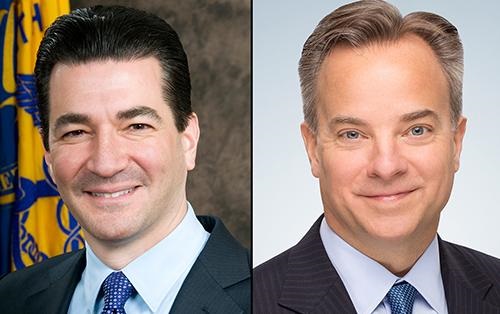Two former FDA commissioners who support changing oversight of laboratory-developed tests (LDTs) say FDA’s regulatory playbook is ‘outdated’
Congress’ attempts to avoid a government shutdown due to a lack of funding presents a final chance this year for two different clinical laboratory bills to be pushed through.
The Verifying Accurate Leading-edge IVCT Development (VALID) Act and Saving Access to Laboratory Services Act (SALSA) could be added to a year-end spending package that will fund government operations. Without the spending bill, the government will shut down on Dec. 16 and not re-open until funding is appropriated.
The VALID Act proposes to move oversight of laboratory-developed tests (LDTs) to the US Food and Drug Administration (FDA). SALSA seeks to reduce lab test reimbursement cuts scheduled for Jan. 1 under the Protecting Access to Medicare Act (PAMA).
As Dark Daily’s sister publication The Dark Report, noted in “VALID and SALSA Acts Still Pending in Congress,” a standalone vote on either bill is unlikely this year. Instead, they would need to be attached to the larger spending bill. (If you’re not a subscriber to The Dark Report, check out our free trial.)

In an article for STAT, former FDA Commissioners Scott Gottlieb, MD (left), and Mark McClellan, MD, PhD (right), wrote, “The FDA is currently working from an outdated regulatory playbook that has left gaps in its oversight of safety and effectiveness and makes it more difficult to introduce new innovations. The [VALID Act] would strengthen protections for consumers and patients for both diagnostic tests and cosmetics and make it easier for manufacturers to introduce better products.” (Photo copyrights: FDA/American Well.)
Political Parties Negotiating
At press time, a draft spending bill had not yet been introduced to Congress as lawmakers from both political parties negotiate funding levels.
A source told The Dark Report that until legislators hammer out those details, add-ons such as the VALID Act or SALSA are stalled. There is no guarantee either lab measure will be added to the spending bill.
“We don’t have agreements to do virtually anything,” said Senate Minority Leader Mitch McConnell (R-KY) to reporters on Dec. 6, according to Reuters. “We don’t even have an overall agreement on how much we want to spend,” he added. Reuters reported that Democrats and Republicans in the Senate were $25 billion apart in their proposals.
Congress could also pass a continuing resolution to keep the government open for a short time, which would allow lawmakers more opportunity to negotiate.
Former FDA Chiefs Weigh In
Meanwhile, proponents of the VALID Act have publicly turned the heat up for the bill. For example, STAT recently ran two commentaries—including a joint piece from a pair of former FDA commissioners—in support of the VALID Act.
Currently, LDTs are regulated through the Clinical Laboratory Improvement Amendments of 1988 (CLIA). However, supporters of the VALID Act argue that the complexity of modern LDTs deserves more scrutiny.
“The VALID Act would create a consistent standard for all tests, regardless of the kind of facility they were developed in or made in, as well as a modern regulatory framework that’s uniquely designed for the recent and emerging technologies being used to develop tests,” wrote Scott Gottlieb, MD, and Mark McClellan, MD, PhD, in STAT on Dec. 5.
Gottlieb and McClellan served as FDA commissioners from 2017-2019 and 2002-2004 respectively. They both currently serve on various boards for biotech and healthcare companies.
Pathologists, Clinical Lab Directors Express Concerns about VALID Act
Opponents of the VALID Act contend that LDT innovation will be stifled if clinical laboratories, particularly those at academic medical centers, need to spend the time and money to go through formal FDA approval. There is evidence that working pathologists in academic settings have legitimate concerns about the negative consequences that might result if the VALID Act was passed as currently written.
In “Might Valid Act Support Be Waning in Congress?” The Dark Report covered how on June 1 more than 290 pathologists and clinical laboratory directors sent a grassroots letter to a Senate committee asking for a series of concessions to be made for academic medical center labs under the VALID Act.
It is reasonable to assert that the majority of clinical laboratory professionals and pathologists are supportive of the SALSA bill, which would stop the next round of scheduled price cuts—as much as a 15% price reduction to many tests—to the Medicare Part B Clinical Laboratory Fee Schedule (CLFS). That is not true of support for the VALID Act, as currently written. Sizeable segments of the diagnostics industry have taken opposing positions regarding passage of that legislation.
For these reasons, both bills will be closely watched in coming weeks as Congress works to fund the federal government while, at the same time, incorporating a variety of other bills under the omnibus bill, which is a considered a “must pass” by many senators and representatives.
—Scott Wallask
Related Information:
S.4449 – Saving Access to Laboratory Services Act
Congress Needs to Update FDA’s Ability to Regulate Diagnostic Tests, Cosmetics
US Congress Could Punt Funding Bill into 2023, McConnell Says


